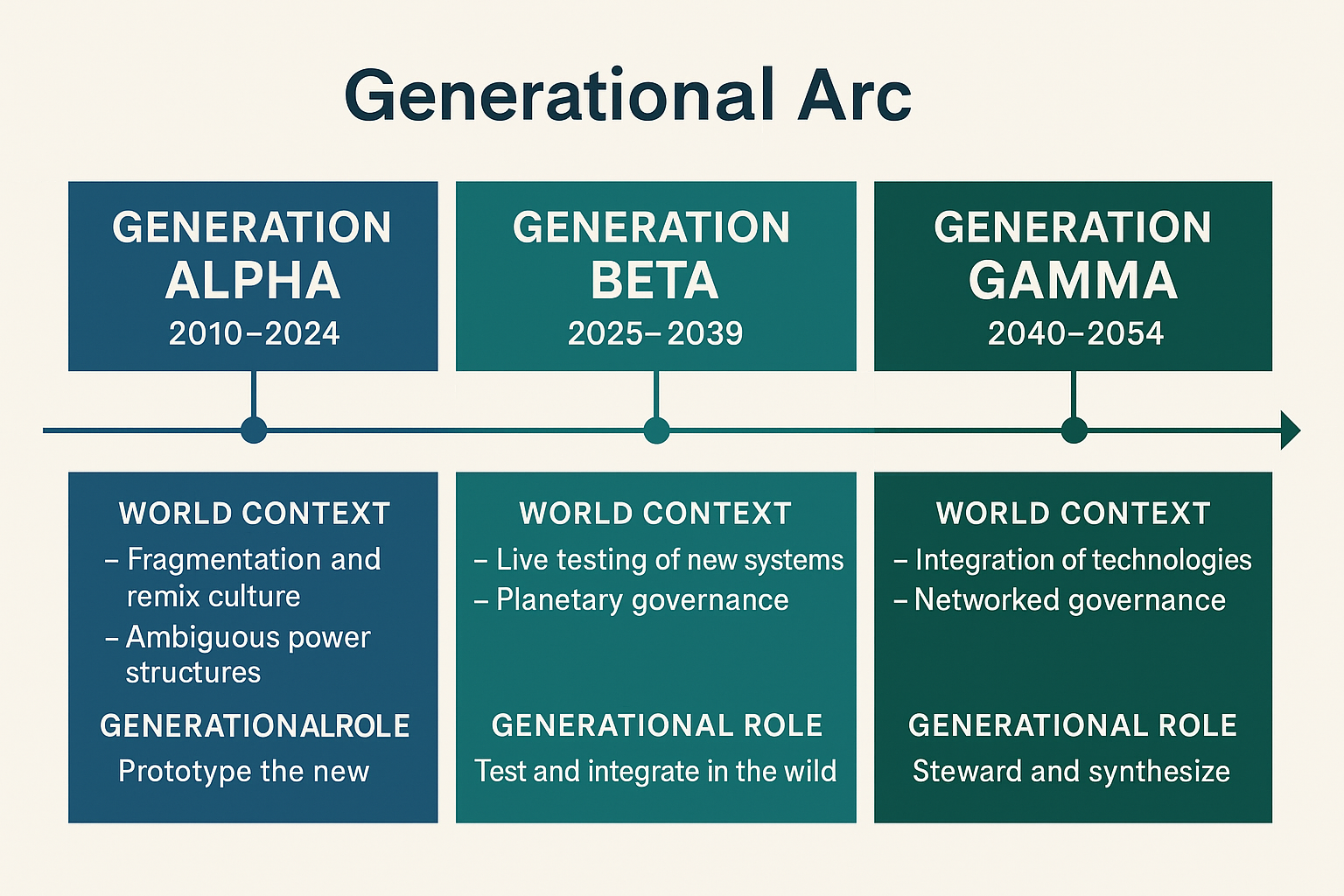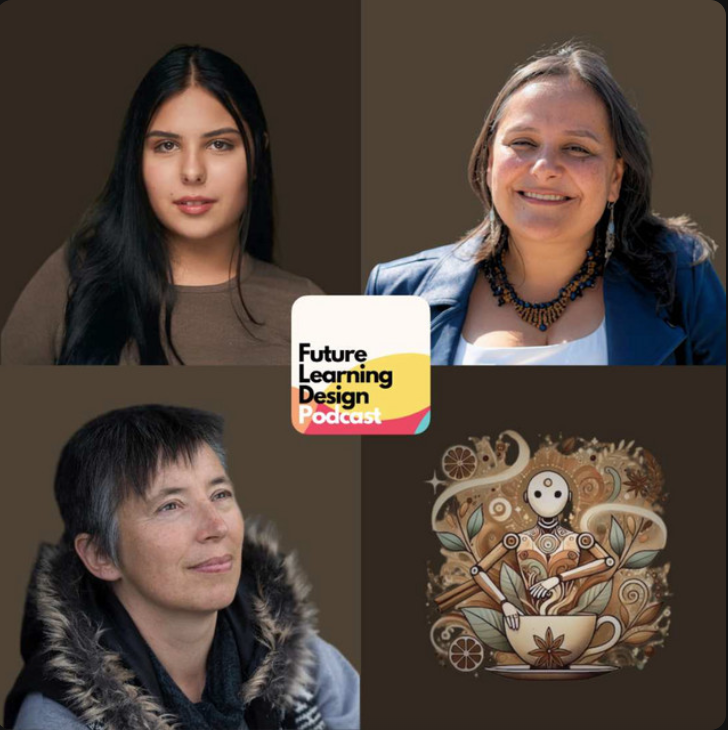Raising Generation Alpha as Future Ancestors
What if our real task in education isn’t just preparing students for college, careers, or the next big innovation—but preparing them to be future ancestors? After all, which generation has done an outstanding job of connecting with past generations and laying the foundations for the next? Arguably, this has not been a priority for anyone. Rather, as each new generation comes along, the previous generations complain about their dispositions and dismiss their expressions, saying, "Oh kids, these days..."
Reframing the way we think about the relationships between our generations requires us each to take responsibility collectively and individually for the world we have created and invites us to think intergenerationally: not just about what today’s young people achieve, but about the systems and cultures they will pass on to those who come after them.
Generation Alpha, the first to be born entirely in the 21st century, stands at a hinge point. They are the prototype generation—the ones remixing culture, questioning authority, and embracing ambiguity as a way of life. Why do they do this? Because they inherited Fake news, Lying governments, Publicly broadcasted genocide and the failing of systems currently in place to address crisis regarding climate, justice, and health. Generation Alpha's choices stand to shape the new systems to replace the decaying ones, and these will be the runway for Generation Beta, who will test the prototypes in the wild, scaling what works and discarding what fails. Beyond Generation Beta lies Generation Gamma, whose role may be stewardship and synthesis—the custodians of fragile systems that need coherence and long-cycle care, to ensure they are stable and sustainable.
It is our collective responsibility to help Gen Alpha fulfill their role as future ancestors. Why? Because Generation Alpha are the first generation of the new world. The first generation to be born at a time when young people have never not had access to voice activated technological assistants like Siri, Alexa, and Google Assistant. The first generation to enter school already fluent in global digital communities, able to play, create, and collaborate with peers across continents before they can even write in cursive.
So, how can we help?
Equip Alpha with Resourcefulness
Instead of rushing them toward certainty, let’s treat ambiguity as a strength. When students say, “the vibe is off” or “low-key good,” they are practicing nuance. Schools can nurture this disposition, teaching them how to turn resistance into design critique and critique into propositions. In practice, this might mean that when a student pushes back on a group project format, teachers invite them to articulate what about it feels unworkable and how they would redesign the collaboration. Or, when students reject a text as irrelevant, educators can ask them to propose an alternative source or lens that better connects with their lived realities. In this way, resistance is reframed as the first step toward constructive redesign rather than simple defiance.
Create Intergenerational Scaffolds
No generation thrives alone. Gen Z cohorts like R4Rs (Rewiring for Realities)—founded by thinkers like Giovanna de Oliveira Andreotti and informed by the scholarship of her mother Vanessa Andreotti—are already experimenting with protocols for resilience and accountability. Their upcoming book Outgrowing Modernity: Navigating Complexity, Complicity, and Collapse with a Sense of Accountability and Compassion offers a provocative look at how we might hinge realities across generations. By hinging realities, they mean creating deliberate points of connection between generations—acknowledging the worldviews each generation inherits and building bridges so those differences become sources of strength rather than fragmentation. After all, the archetypes we create to explain generations are fluid. As a Gen X / Elder-Millennial, I embody some dispositions of each generation that came after me, and I relate to Boomers, too. In practice, work like the R4Rs cohort shows how Gen Z can provide language, frameworks, and momentum, while Alpha brings creativity, remix, and ethical instinct. Together they can design futures Beta will pressure-test.
Institutionalize Hinging Practices
Education must model new forms of governance, because the structures Alpha will inherit are clearly showing signs of strain. If Beta is to stress-test new designs and Gamma is to steward them, Alpha must have rehearsal space for building fairer and more participatory systems. By new forms of governance we mean approaches such as shared authority in classrooms, co-created agreements, and student-led inquiry, which simulate decentralized, networked, and collaborative modes of decision-making rather than rigid hierarchies. Every “no” they articulate should be an opening to ask, “what principle or practice might you offer instead?” In this way, daily school life becomes a microcosm of democratic experimentation.
Safeguard Against Authoritarian Drift
History warns us that when transitions fail, authoritarianism fills the void. To prevent this, we must teach systems literacy—how power concentrates, and how it can be diffused. The International Baccalaureate's Systems Transformation pilot with the United World Colleges may be of interest, to some. Listen to Episode 10 of the Education By Design podcast to learn more. We must embed pluralism as strength, not weakness. Most of all, we must cultivate what Vanessa Andreotti calls custodial imagination: the sense that our role is not only to dream of better futures, but to become responsible ancestors of those futures. This involves imagining ourselves as ancestors in training, considering how our actions today ripple into the lives of people we will never meet. It calls for humility in acknowledging the fragility of the systems we pass on, creativity in designing practices of care, and accountability in tending to relationships across generations, communities, and ecosystems. In practical terms, custodial imagination shows up when we pause to ask: If my great-grandchildren were in the room, how would I act differently?
This is the relevance of intergenerational hinging. Alpha will prototype, Beta will test, Gamma will steward. But the hinge is here, now, in how we raise Alpha—not just as children of the present, but as ancestors of the future.
Resources
Future Learning Design Podcast: Outgrowing Modernity - A Conversation with Vanessa Machado de Oliveira Andreotti, Giovanna de Oliveira Andreotti and Manda Scott (13, Aug 2025), hosted by Tim Logan for Good Impact Labs


